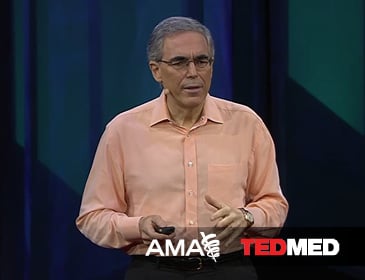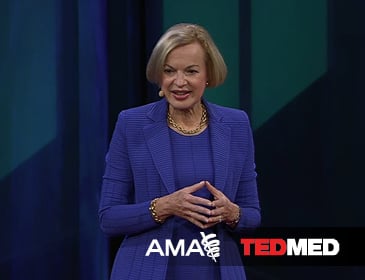Physicians, health care leaders and innovators examined and celebrated unbridled imagination at TEDMED 2014, which began Wednesday and runs through Friday in San Francisco and Washington, D.C.
On the first day of TEDMED, the annual health and medicine edition of TED, transformative thinkers encouraged listeners to question current knowledge. Instead of putting imagination on trial, Jay Walker, curator and chairman of TEDMED, urged listeners to embrace new ideas.
“Health and medicine is about to change more in the next 20 years than in the last 20,000 years,” Walker said. “We’re rapidly heading for the biological version of the Big Bang.”
Tomorrow’s physicians will need to accept that they don’t—and won’t—know it all, and maintain humility in admitting that they need answers, said Elizabeth Nabel, MD, president of Brigham and Women’s Hospital in Boston.
“Have the intellectual courage to say, ‘I don’t know,’ because it’s empowering,” said Dr. Nabel. “And only then can you add, ‘I’m going to find out.’”
And what if you do have the power to know it all? For Amy McGuire, PhD, a geneticist and director of Baylor University’s Center for Medical Ethics and Health Policy, the ability to know the code to your existence still doesn’t guarantee having all the answers. McGuire gave listeners a close look at where genome sequencing is headed, but stressed that “there is no genome for the human spirit.”
Dr. McGuire’s ideas echoed Dr. Nabel’s—that humility is a crucial quality in physicians of the future. “Students and trainees have access to the ability to find information,” she said. “Medical education reform is changing the curriculum and teaching people to research and get the answers they need... and recognizing that we might not know everything.”
Besides embracing innovation, listeners were able to hear about groundbreaking work that’s already a reality. For example, Gail Reed, international director of Medical Education Cooperation with Cuba, shared how more than 20,000 young people ended up in Cuba to transform health and improve access to care in the poorest places on the planet.
Reed talked about the Latin American Medical School, which recruits students from underserved areas with the specific goal of producing physicians who will return to their birthplaces to provide care. Students learn to treat the whole patient—mind and body—in the context of their communities and culture.
“Training has moved out of the ivory tower and into clinic classes and neighborhoods,” she said of the school, which has graduates from 83 countries. “Community-based learning starts on Day One.”
Watch TEDMED live from your computer or personal device through Friday, or watch the program on-demand through Sept. 16. Visit the TEDMED 2014 website and enter invitation code “TMLicAMA14” to participate. Video of the above speakers now can be found on demand at the TEDMED site.
The AMA is a global institution partner of TEDMED 2014.





